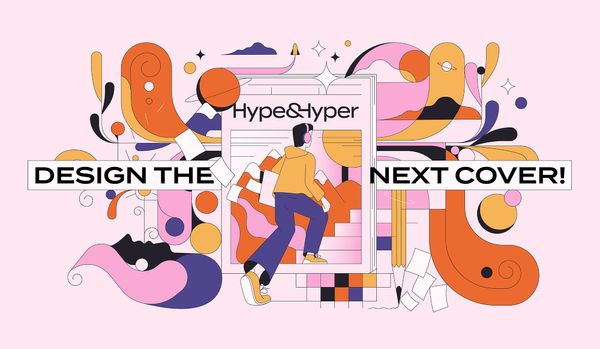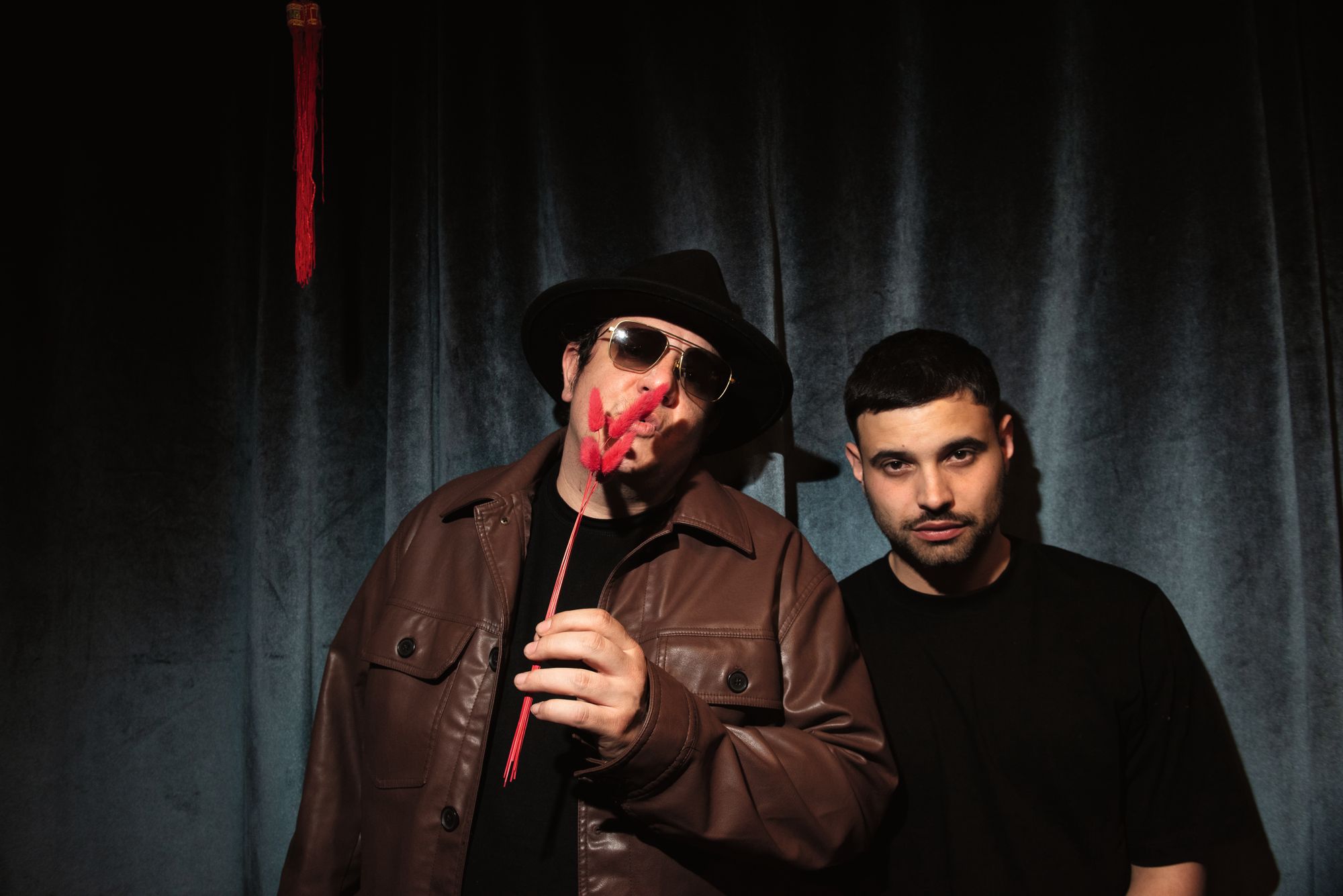With two mixtapes and around fifty tracks under his belt, the rap career of Beton.Hofi has really taken off in the last three years. Constantly being in the public eye requires a lot of work, but luckily enough, he shares the load with co-creator Miki357 who’s also become a true friend in the process. Finding a whole day to spend with the creative duo proves to be a lot more complicated than before, but on a balmy early summer day, we set out to explore the city. We talked about the basis of their synergy, what had already happened and what might the future still hold for these two whose energy feels like excellent players passing the ball back and forth in perfect unity.
This article originally appeared in issue no. 8 of the Hype&Hyper print magazine.
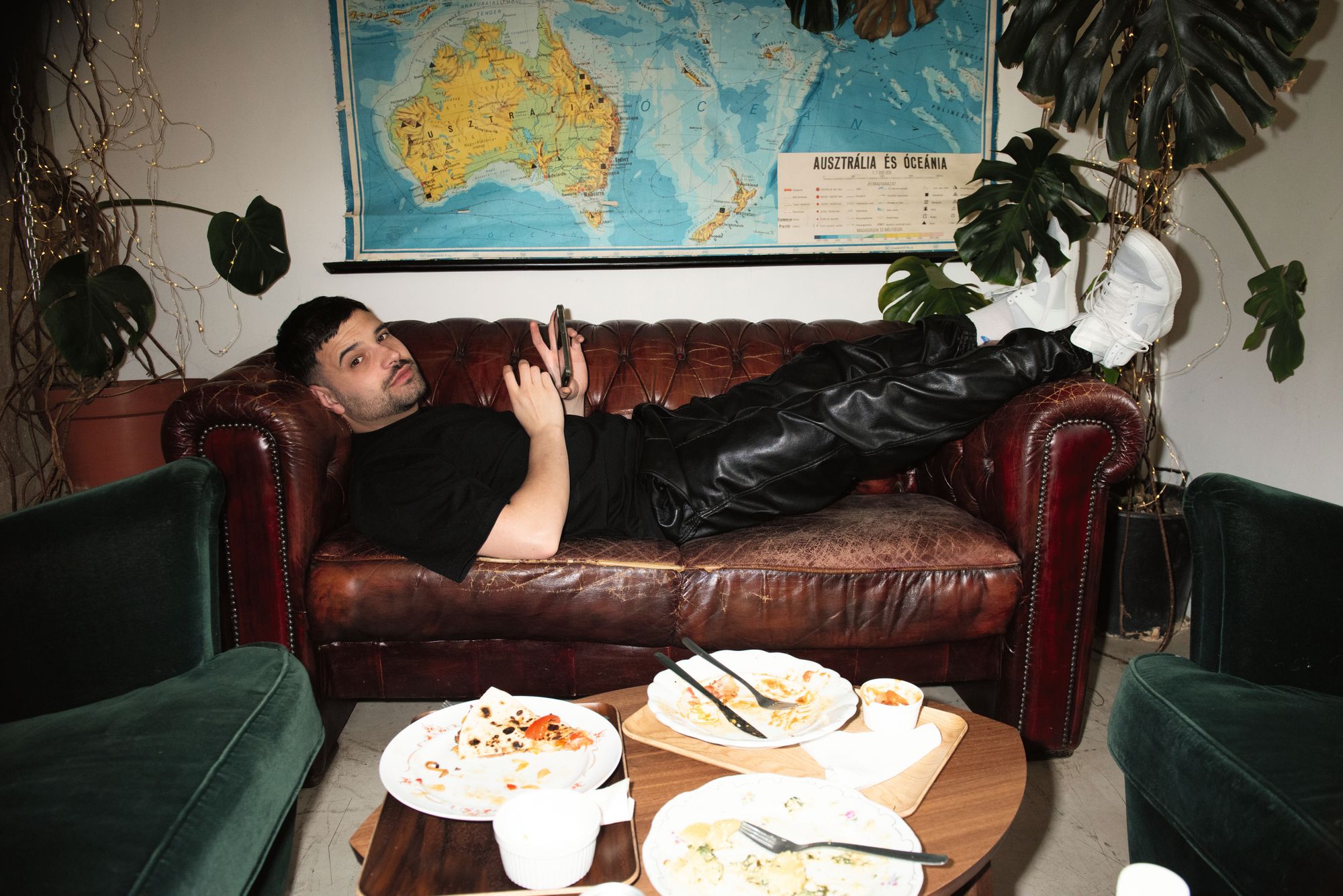
English breakfast for Ádám, a potato casserole with spinach for Miki—time to start the conversation.
Your journey together started with shooting the music video for Közel-Kilét-Európa, that’s where you first met. Can you tell me a bit about this period? Ádám, what did you know about Miki at that time? Why did you choose to work with him?
Ádám: I was already familiar with Miki’s work, but I was yet to connect the dots that the visual world of the music videos of Punnany Massif and Baba Aziz is made by the founder of Kriminal Beats, someone whose name is well-known in the graffiti scene. Still, I gravitated towards what I’d seen, I felt that we share a similar vision about what we wanted to say about reality.
When I started making music, I often wrote down things that I’d like to do one day in my career, and one of those things was shooting a music video with the creator called Miki357. I think that this is a case of manifestation.
Was it obvious when you started filming that you were going to keep working together? What do you think is the basis of your bond, your creative synergy?
Miki: As I recall, it took a long time…
Ádám: Yes, because at first, I had to get his attention without having any mutual connections or acquaintances. From an everyday perspective, that period for me feels incredibly cheeky—it was strange to experience the bohemian, decadent way an artist carries himself. I stayed very open though, as I wanted to break out of the environment that represented my social network at the time where I spent my whole life up to that point (...) However, I felt that while I was willing to give up everything, it was just a fleeting whimsy for him to decide whether he feels like replying to me or not—it was a shock even to me. But when we finally met face-to-face, we hit it off right away.
Miki: So we made the video, but then Covid happened. As I remember that period, we spent almost all our time together. Something like that.
Ádám: (...) We hung out a lot during Covid. Some of those days were spent working but it was as chaotic as the way we met. Then I learnt that even if not everything is super organised, or if the steps of the design process are not linear—something that was very hard for me to accept at first—I needed to stay open. The fact that we dare to call anyone, dare to do anything, basically running away, but still forward, is a similar method of creation to when I write my lyrics freestyle, like on an impulse. And I realised that this is what I do too, I just wasn’t aware—what Miki is the strongest in his field, is the same thing I’m strongest in my domain. This clicks very well, the rest we battle out.
This was the first project of yours we wrote about in Hype. In that interview Ádám, you said “Everything I do is to one day become an unavoidable MC in Hungary”. Now, in one of your lyrics, you say that you didn’t know how many sacrifices it would take. Could you elaborate?
Ádám: I had no example or reference to what it feels like when a face and name become known to an audience of this magnitude in such a polarised country. This is not something you can get ready for even if you long for it—you may want the lesson, yet it’s still frightening when it actually happens.
For a long time, I pictured it as a prison with see-through walls: you get out of the ordinary fabric of society while still being visible. You exist in a glass cage, and while you can connect with those sharing the cage with you, from the outside, you are bombarded with expectations. I feel that in this situation, unconditional adoration or love is super rare.
The restaurant starts to fill up, it’s time to move on. Ádám has an interview scheduled for the afternoon, but we still have time. On a whim, we walk over to the Unicum House where we are greeted by the brand manager who guides us to the underground labyrinth filled with 500 oak barrels in the old distillery. The boys are in their element… after sampling some of the drinks we continue downtown to the studio of Klubrádió where we wait for Ádám with Miki at the bar on the ground floor.
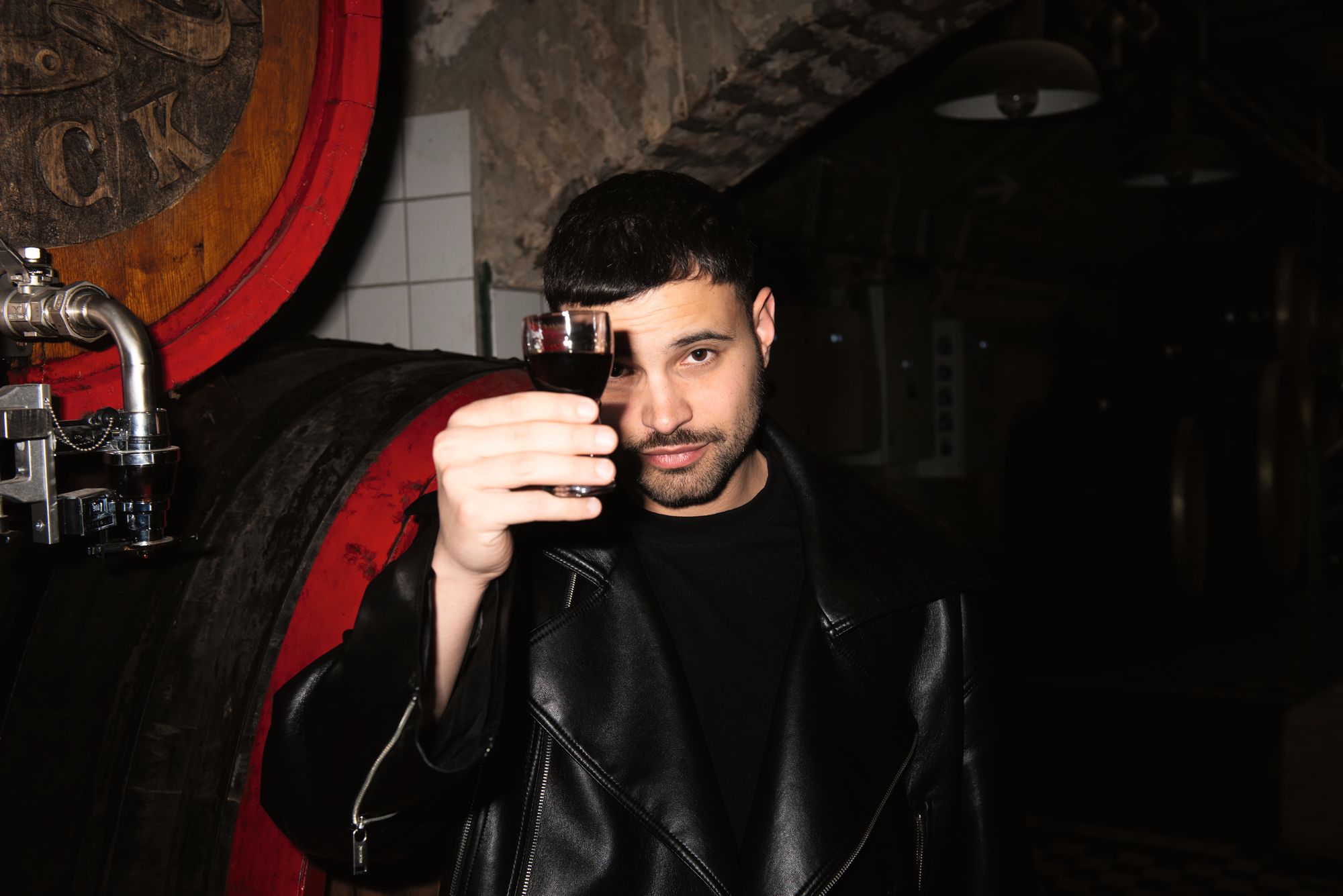
The restaurant starts to fill up, it’s time to move on. Ádám has an interview scheduled for the afternoon, but we still have time. On a whim, we walk over to the Unicum House where we are greeted by the brand manager who guides us to the underground labyrinth filled with 500 oak barrels in the old distillery. The boys are in their element… after sampling some of the drinks we continue downtown to the studio of Klubrádió where we wait for Ádám with Miki at the bar on the ground floor.
…after the interview, we get in a taxi and head to Budapest Park. The backstage complex made of colourful containers has recently been expanded to provide a space to let off steam for musicians from all over the world—tonight will certainly be no different. It’s already late afternoon and it has just started to rain…
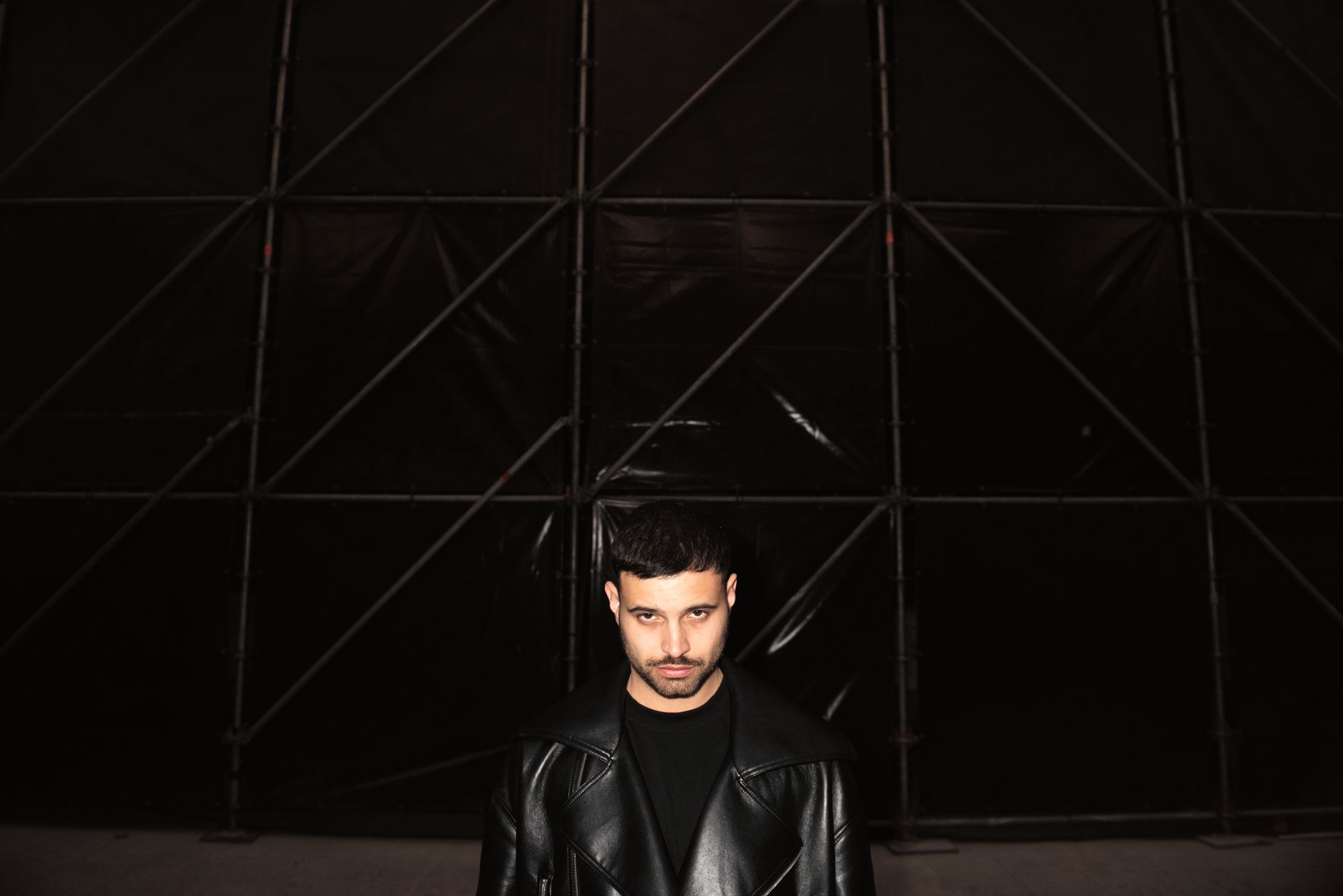
Ádám, in an interview you talked about the message of songs written for the drawer versus sharing songs with the public—how the latter carries responsibility. Do you shape your thoughts, your message differently now? Does publicity influence the way you create?
Ádám: Being in the public eye—and taking an autonomous part of art—is good because it lets you examine certain questions in a different light: is there anything I’d like to change, if yes then why, what would that entail, who would I become in that setup? And this makes you able to reach a decision. I don’t think my music has changed. Indeed, my big revelation was that the second album wasn’t less explicit or less experimental—on the contrary! Which, I believe, is a good direction as it is more daring. I reacted to the increasing pressure by standing my ground. I didn’t wait for ten years only to become inauthentic, otherwise, I wouldn’t be able to finish the narrative I came up with.
What is the message you’ll always stand by and feel important to convey?
Ádám: According to my latest ars poetica, I have two things—and essentially this is why I’m doing this at this level, because let’s face it, I could have stayed at the much less harsh, underground scene. (...) My mission is to keep going and show that what I do can be done freely—and freedom works if caring is woven through it: it is what drives my actions and I can also feel it coming towards me. We have to care for each other and let everyone do whatever they want. Not a complicated message.
Secondly, I believe that the current stage of capitalism is not leading society in the right direction and it binds most of us. In this sense, freedom also means that no government institution should force itself inside the contours of any generation and I shouldn’t wait and expect something from someone all the time.
If we gave each other a little more space, something new, something different could emerge out of it.
How can you summarise the responsibility of a music video? Essentially, visuals support the music, however, it can also strengthen, clarify or even shape the message—what is your approach to this?
Miki: You can make any kind of music video, but if the music itself is not good enough, it just won’t help. As for Ádám, even though I’ve done several rap music videos, his music complements my visual world perfectly.
Ádám: The most important function of a music video is to take the whole experience including the song to a space that lifts it up to an elevated energy level and makes it more complex.
A good music video makes your mind buzz.
Miki, do you always have some ideas in mind you can work with when listening to a new demo or do you translate what you hear into visuals on the spot?
Miki: I don’t really have a recipe for that, I usually come up with something for the given project.
I don’t think that there’s an idea that you can force yourself to work with everything, and this is true for everything, not just in the case of Ádám’s work. Of course, I have some ideas about composition that I use from time to time, but that’s not about concept, it’s more about the form of expression I use.
Besides music videos, almost all the photographs published of Ádám are shot by Miki. This means that someone who doesn’t know you personally but thinks of Beton.Hofi, imagines the character in the pictures and music videos the way Miki sees you. These images represent a well-thought-out, particular atmosphere—is that a conscious part of character building?
Ádám: I actually like his photos the best. I haven’t seen any images of other Hungarian photographers of myself that made me say: I wish they were my Miki. The other thing is that because of our personal relationship, whatever mood I’m in—whether I’m angry at him or sad—even through the lens, I look like who I genuinely am. So it’s really good when you don’t want to hide your real feelings from your photographer.
By the time it gets dark, we are hungry again. Luckily, we’ve already booked a table. As soon as we sit down in Ensō, gourmet kimchi platters, Gillardeau and soft Pão de queijo arrive in rustic-style plating, in accordance with wabi sabi’s beauty philosophy.
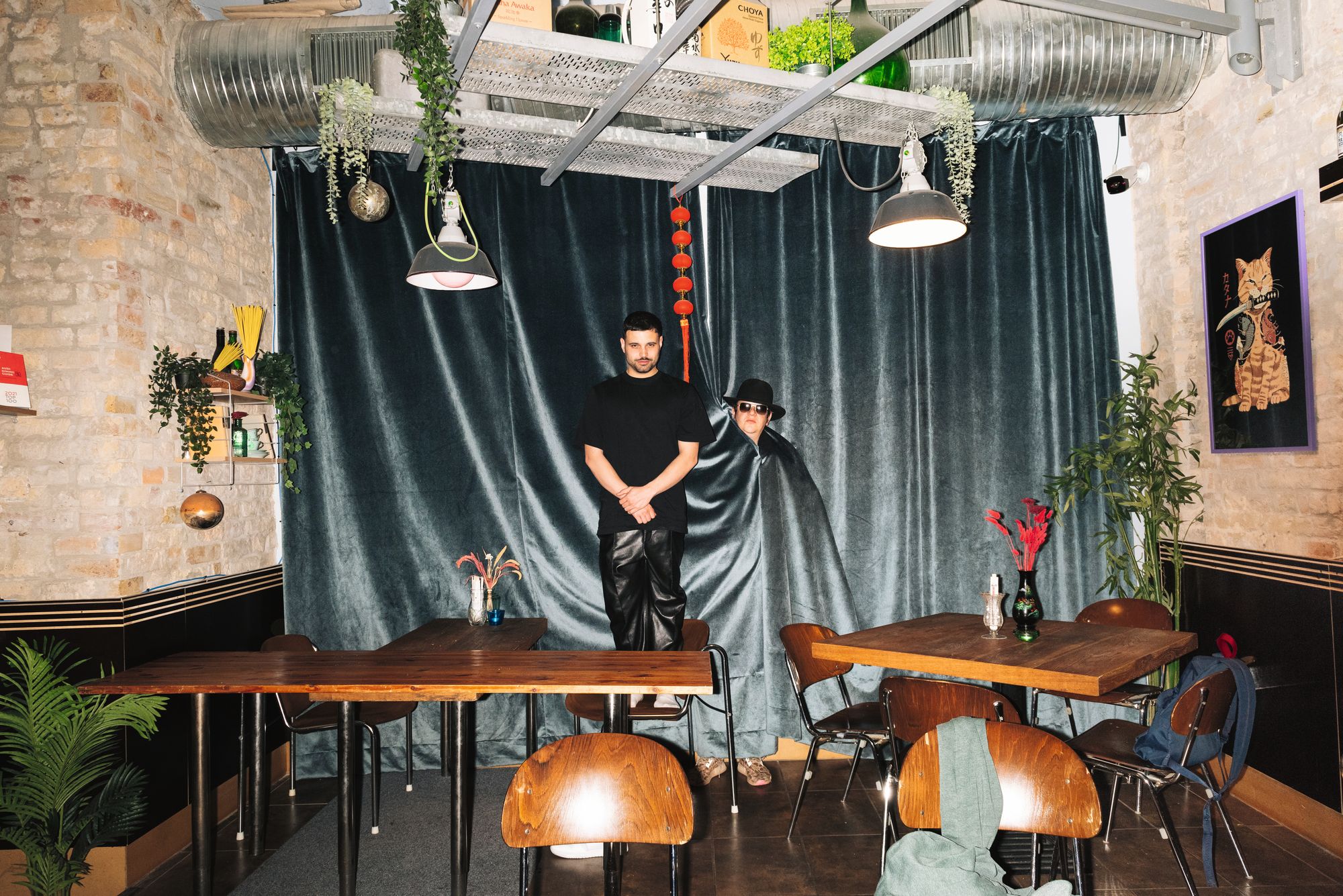
Is there another art form—movies, books or music—that you regularly enjoy? What are the topics you two have intellectual discussions about? Do you do cultural activities together—do you go to exhibitions or watch art house movies?
Ádám: If you think about it, it has become hard to keep track because walking on the street or showing something on your phone might already count as quality culture—but this kind of understanding of the world happens all the time between us. I find it especially exciting to talk to someone who is so knowledgeable about movies and from one moment to the next can switch from discussing narratives to questions about the visual language and still provide quality information. So we mostly talk about movies or other music productions.
Miki: The thing is, I used to regularly go to exhibitions in Vienna this is, for example, something that I’m missing in my life right now. Or I have a large collection of art books I used to browse for entire afternoons while listening to vinyl records… this all feels like a distant memory now.
Ádám: I’m the one reaping the benefits—it’s great for me that he used to go to Vienna since we can still talk about those experiences.
Miki: I can feel—or this perfectly shows—that so many things had happened with our project in the last few years. I find it fundamentally difficult not to do the same things when I’m relaxing that I do for work—in our case, to have fun and to entertain.
Ádám, you mentioned several times that a new mixtape is in the making—some of the tracks you’ve already played at concerts. What is the imprint of all the experiences you’d had since the previous record going to be like? How is it going to be different from the previous ones?
Ádám: Generally speaking, I understand myself and the reactions of people better. I can see my environment in a greater context. And as for the language of expression, I feel that I levelled up as well. Now I have everything for real, ambitious creation—the road to get here was bumpy, but I now understand what we’re doing and that makes all the difference.
Do you have an ongoing project that you can tell me about?
Miki: There are several things in the making—around the end of September, beginning of October, we’ll launch things that take us to the next level both professionally and in terms of production. As you can see from the pictures, we are preparing for a concert at Budapest Park…
Ádám: We always put extra energy into preparing for larger projects, however, when you do character art, everything—mp3s, music videos, a concert— is part of a holistic universe that we need to stay true to and expand in line with the idea of the Hungarian artist archetype. Until now, I could only think of creation in the form of a project, but it had slightly changed—we just need to stay productive! This is our upcoming project.
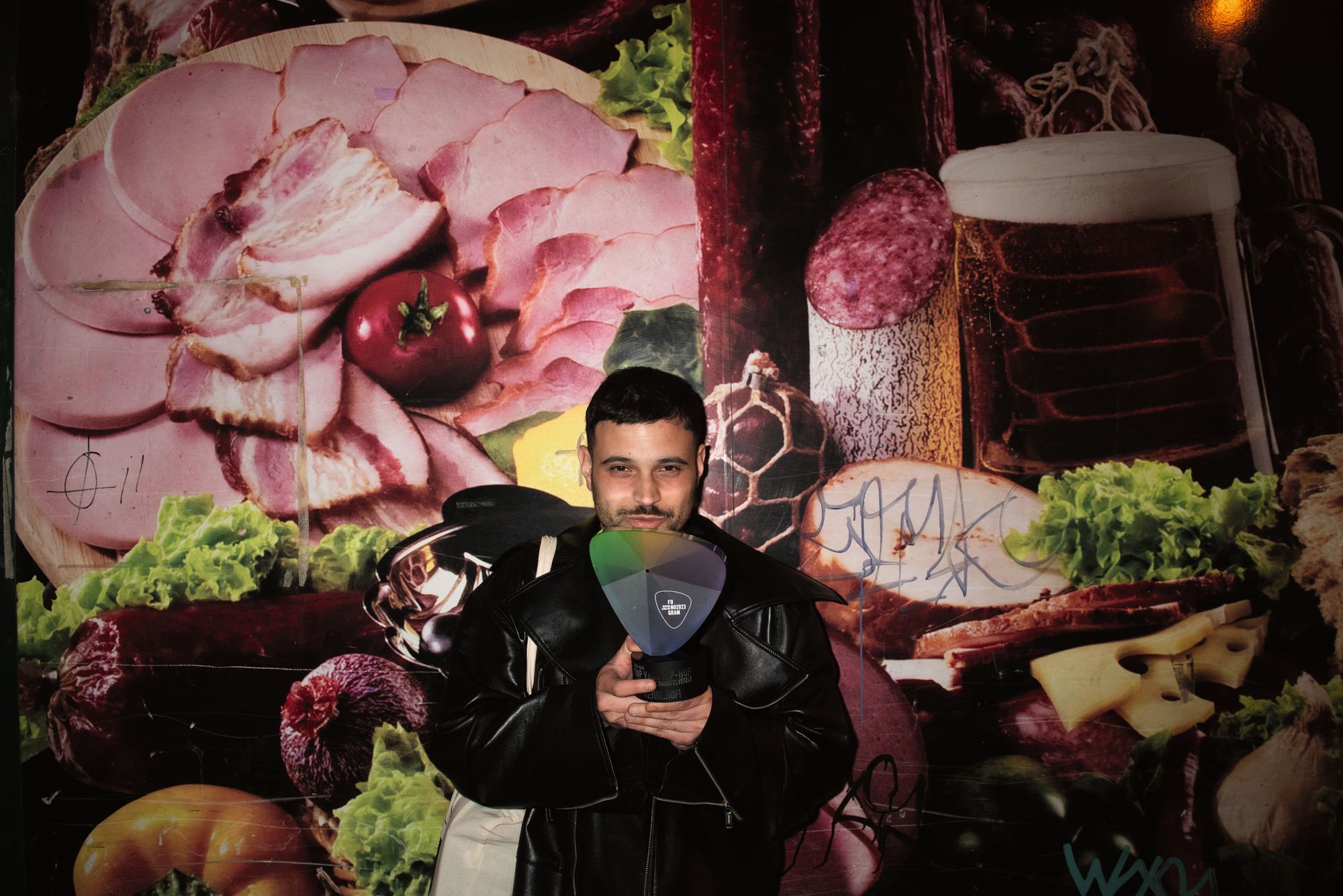
Five questions:
What is the one thing others might find surprising about you?
Miki: That I’m a fun person.
Ádám: I don’t eat wings.
If you could choose to live in a country with all its comfort, which country would that be?
Ádám: Japan.
Miki: I’d love to live in the US with my friend Marcell Rév. If I had to go alone, I’d choose Tbilisi, Georgia.
What are the things that really upset you?
Ádám: Malice, small dick energy, wasting energy.
Miki: Slow people, inability to decide, the complete lack of practicality.
If you could only eat one thing for the rest of your life, what would that be?
Ádám: The blood of lame “MCs” fried with onion, straight from the pot.
Miki: Rice or spinach.
Ádám, how do you prepare for your concerts on the day or right before going on stage? Has your ritual changed since the classic DJ - MC parties?
Ádám: I manifest, clear my thoughts. I stop eating two hours before, I only drink water. What happens after is a different question.
It did change. It has become more disciplined.
… Miki?
Miki: I prepare for concerts by staying as far away from Ádám as possible so he can stay calm.
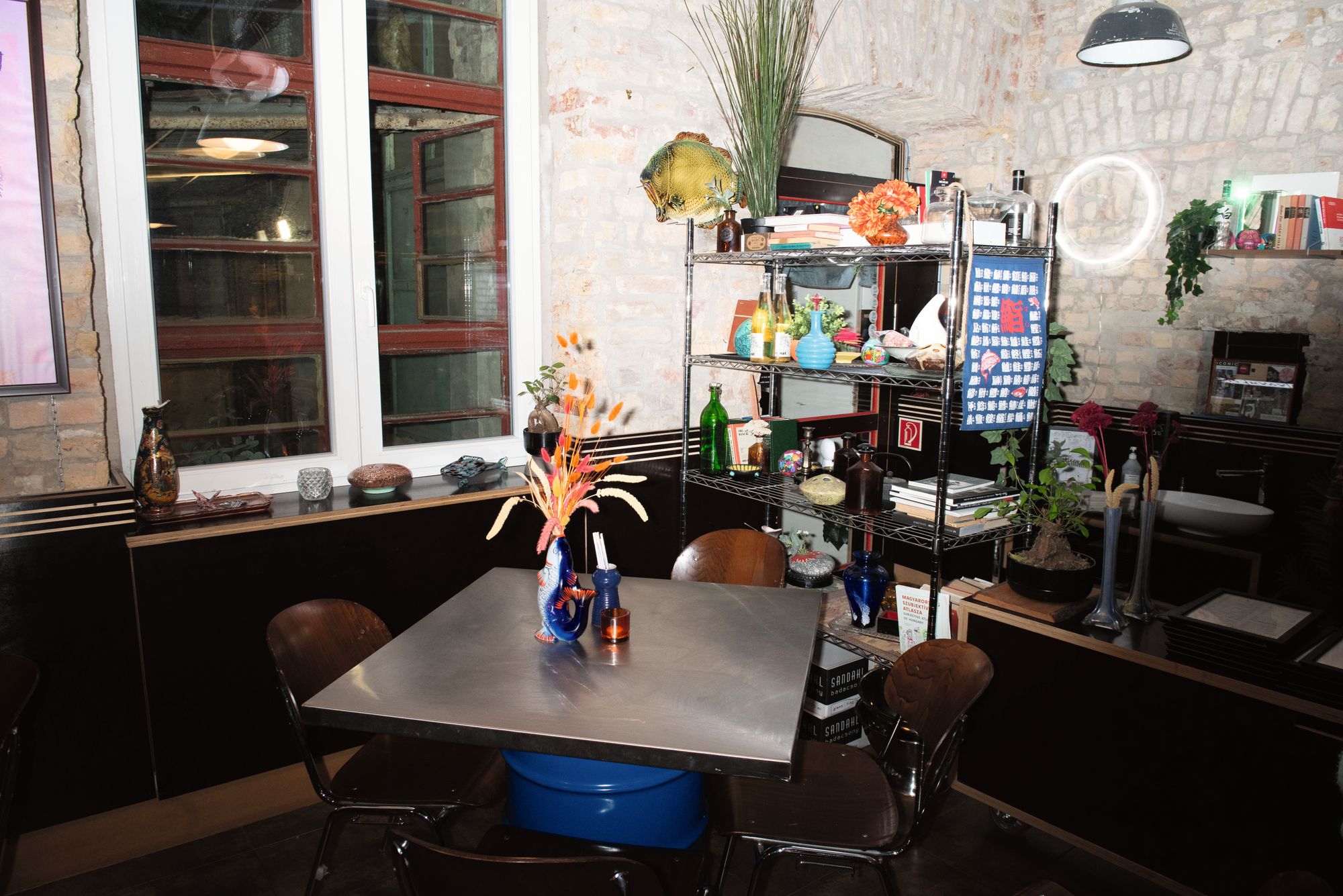
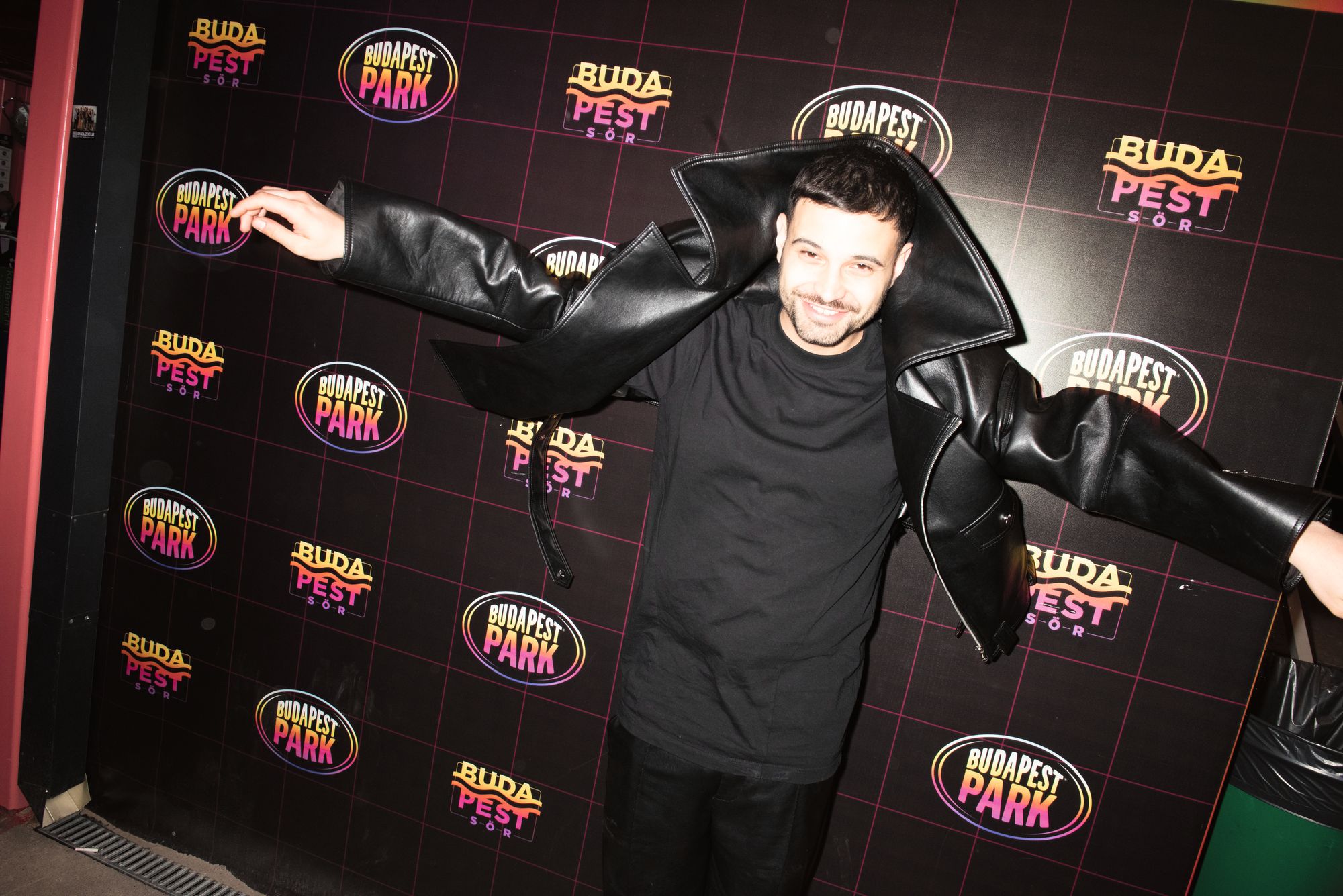
Our hot spot’s during the day:
Reggel Délben
Budapest, Haller street 18, 1096
Zwack Unicum Ház
Budapest, Dandár street 1, 1095
Budapest Park
Budapest, Fábián Juli square 1, 1095
Ensō
Budapest, Baross street 85, 1082
Központ
Budapest, Madách Imre street 5, 1075
Beton.Hofi | Instagram
Photos: Miki357 and Zsófia Sivák
Continue reading H&H issue no.8!
ORDER HERE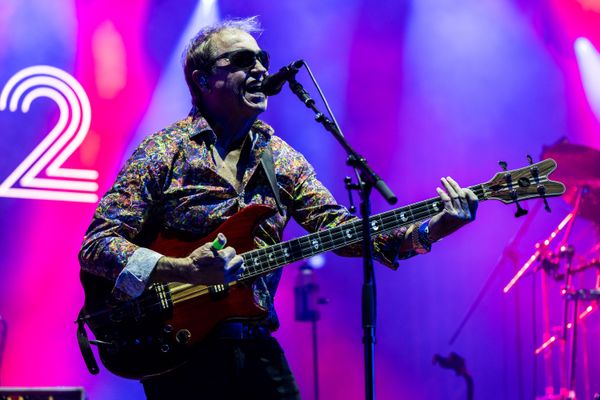
Interview with Mark King at the 11th Paloznaki Jazzpiknik
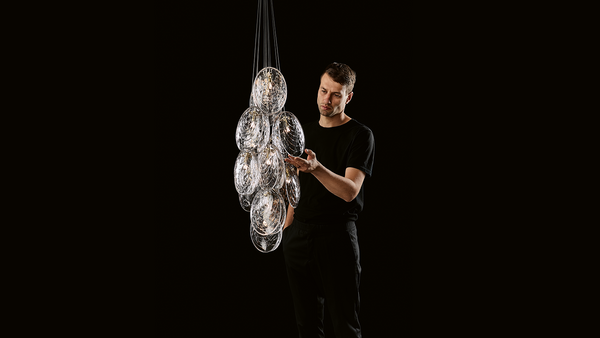
Glass is still relevant even in the age of new high-tech materials | The (Czech) glass phenomenon
